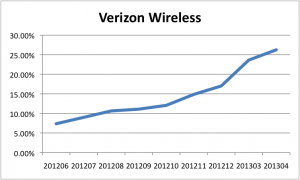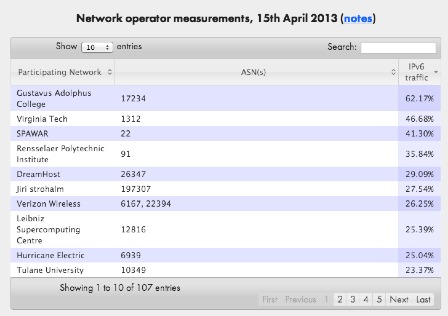 We were very pleased to learn via a blog post that a new set of network operator measurements are up on the World IPv6 Launch site at:
We were very pleased to learn via a blog post that a new set of network operator measurements are up on the World IPv6 Launch site at:
http://www.worldipv6launch.org/measurements/
One of the most interesting statistics to me was that IPv6 traffic on Verizon Wireless’ network has now climbed to 26.25%. This reflects the fact that IPv6 is part of Verizon’s rollout of LTE, as documented in a Verizon Wireless presentation about IPv6 and LTE given at APNIC 34 in August 2012.
Congratulations to Verizon Wireless for passing the 25% mark! They are the first to do so of the mobile operators that are being tracked as part of the World IPv6 Launch measurements.
I’ll note, too, that when you go to that IPv6 measurements page and click the column headed “IPv6 traffic” twice you wind up with a list sorted by highest percentage of IPv6 that is quite interesting:

Somewhat predictably a number of universities are leading the way with Gustavus Adolphus College having an outstanding 62.17% of all traffic being IPv6. Great to see the U.S. Navy’s SPAWAR network in there, too, with 41.30% IPv6 traffic. It’s also nice to see webhosting providers Dreamhost and Hurricane Electric in the top 10 with just over 29% (Dreamhost) and 25% (HE) of all their traffic being IPv6. I admit that I do find it a bit fascinating to scroll through the lists and see who is doing what with IPv6. The graphics further down the page are also interesting to see.
Note that these measurements are only from network operators that ask to be included in the World IPv6 Launch. If you are a network operator providing IPv6 connectivity and are interested in being included on this list, please fill out the form on the World IPv6 Launch site.
Now, the question in my mind is, who will be the next mobile operator to climb over 25%? And how soon will Verizon Wireless pass other prominent marks?
